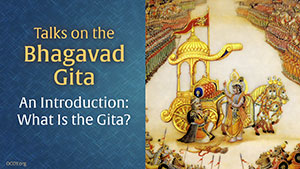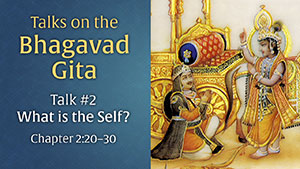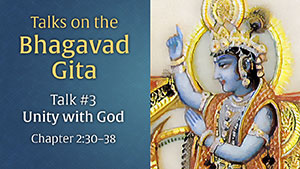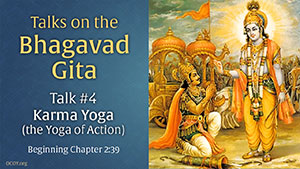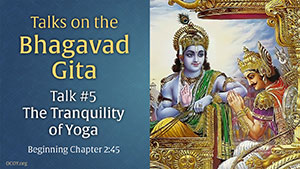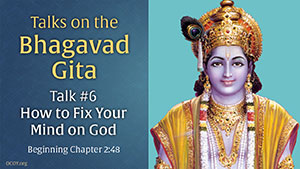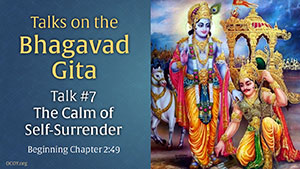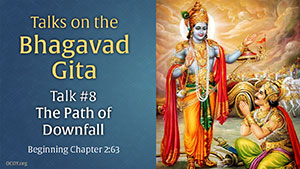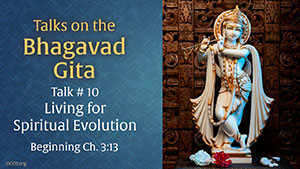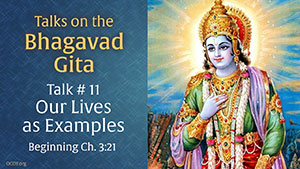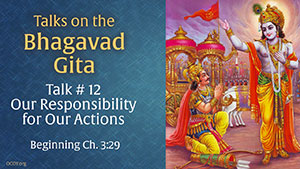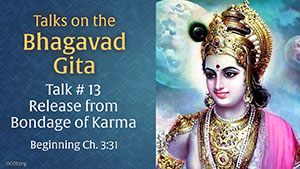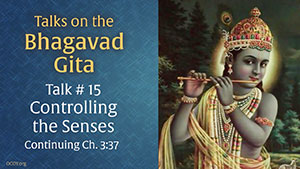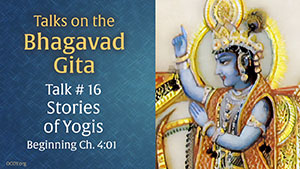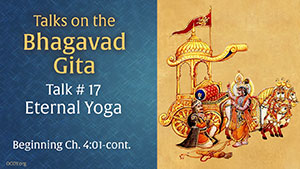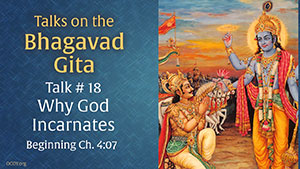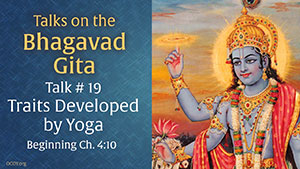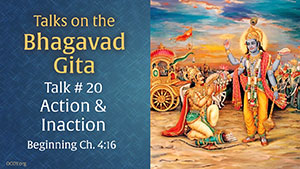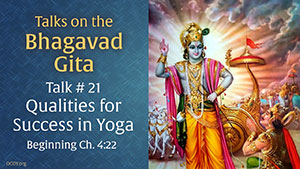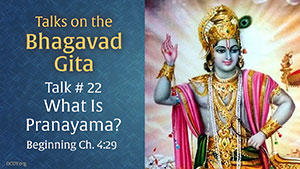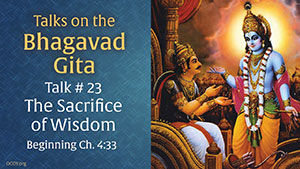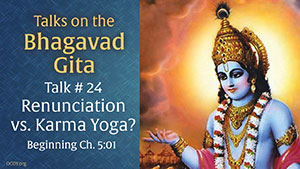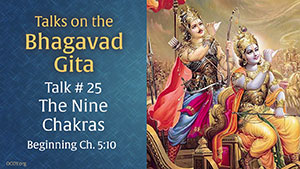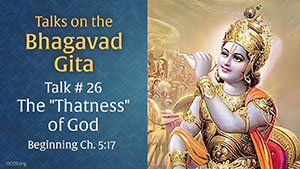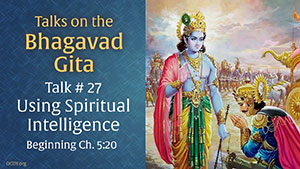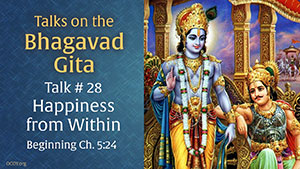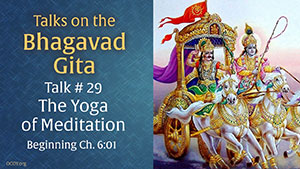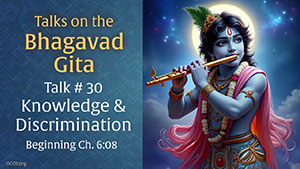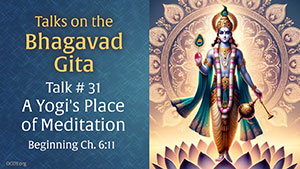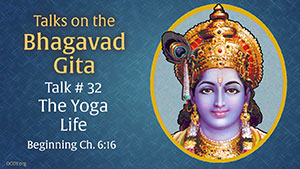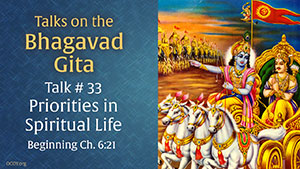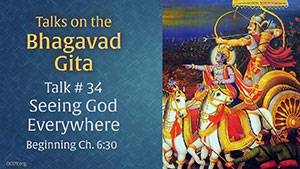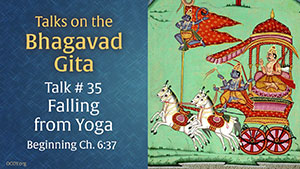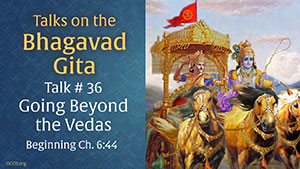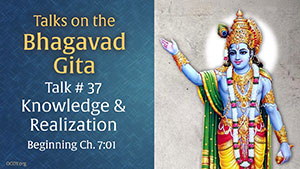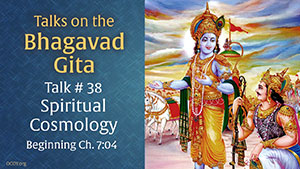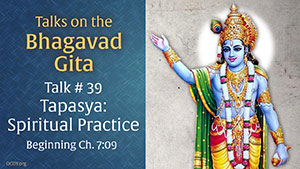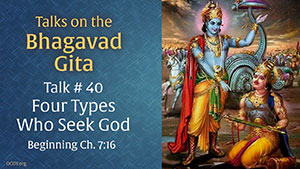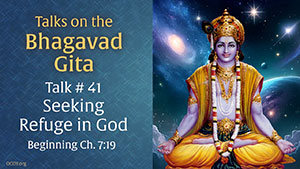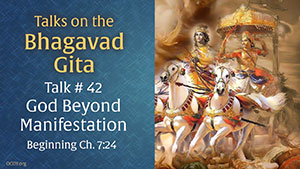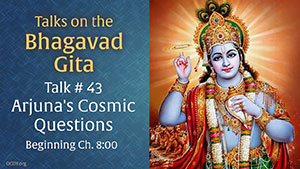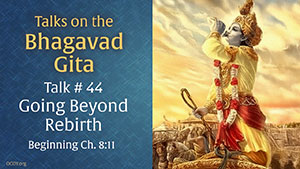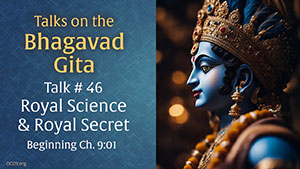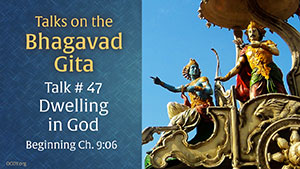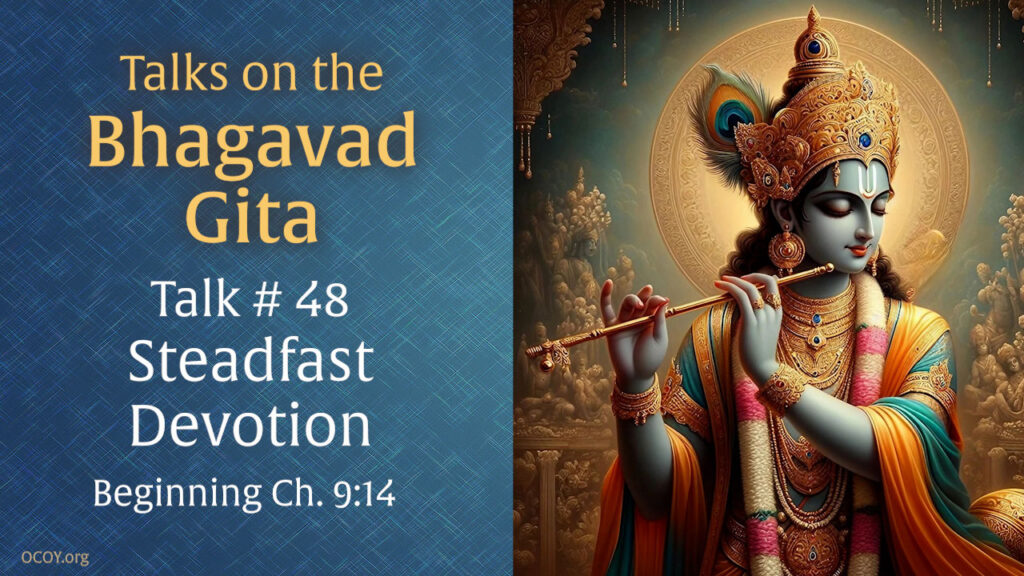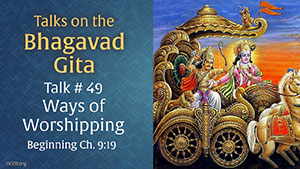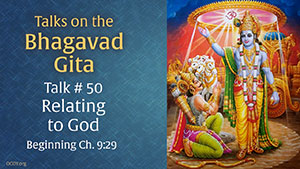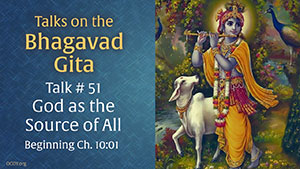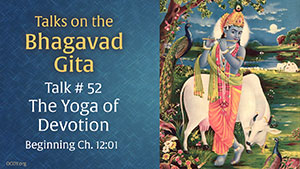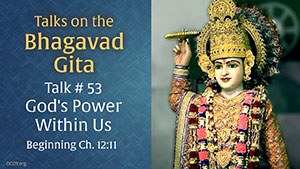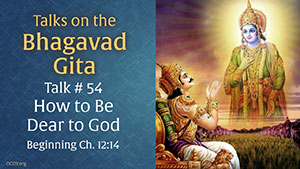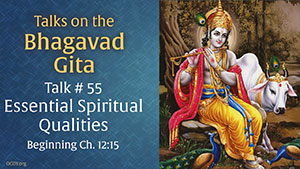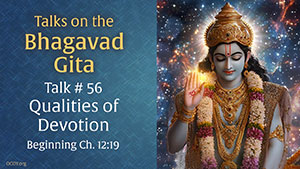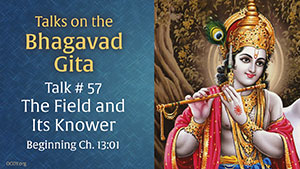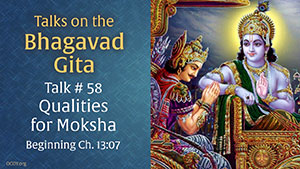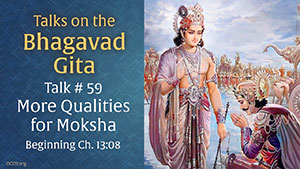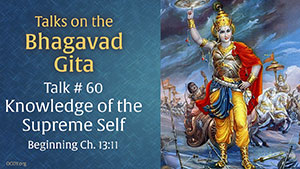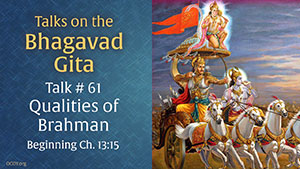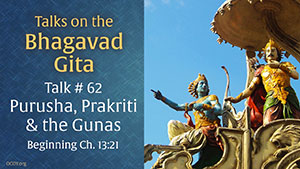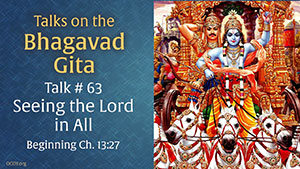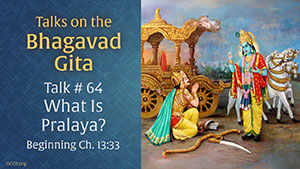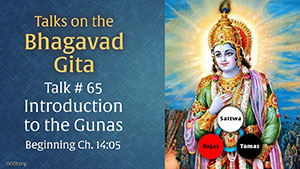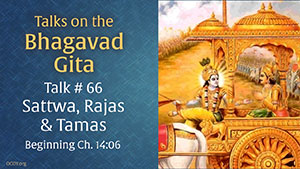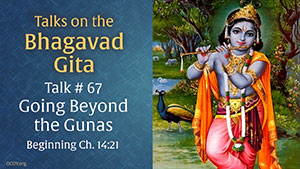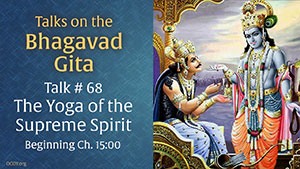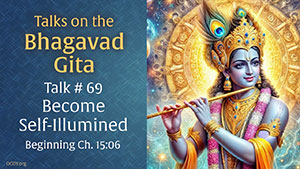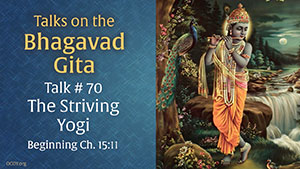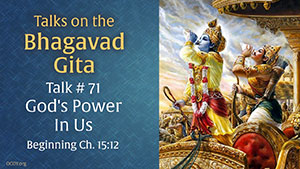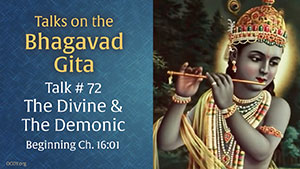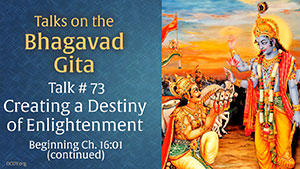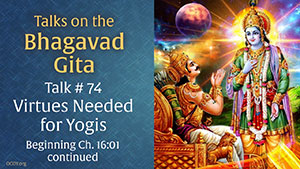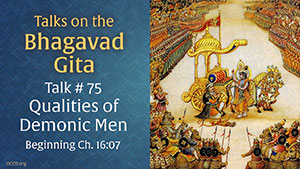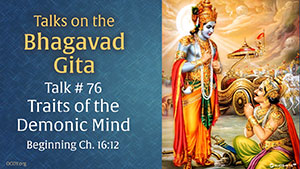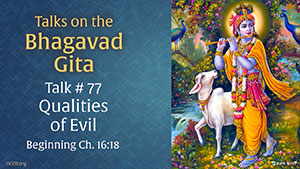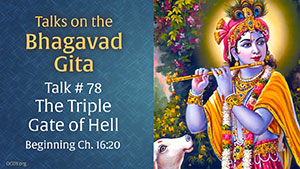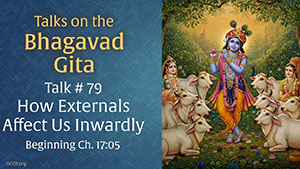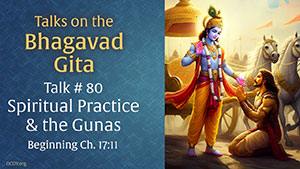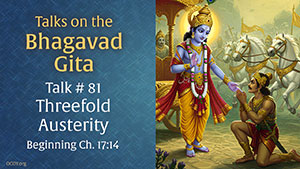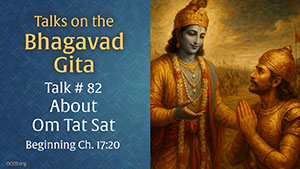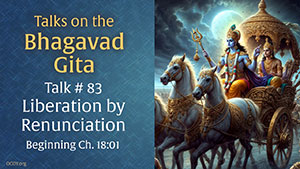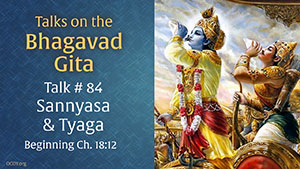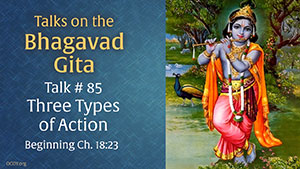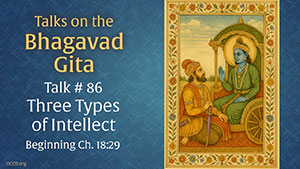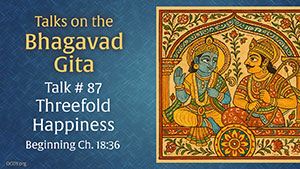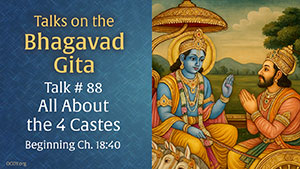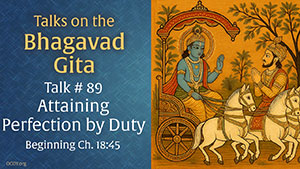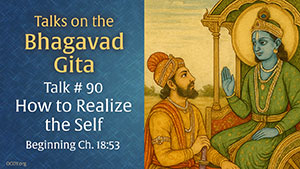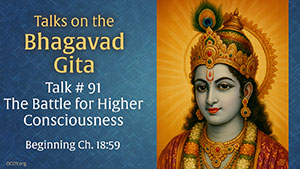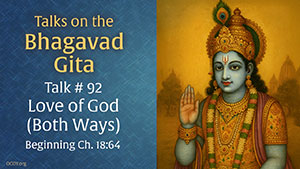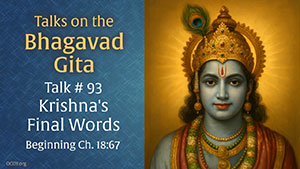Here you will find links to all of the Gita Talks. Click on the image or the links in the description text to take you to the individual talk you wish to watch. You can also use the Study Guide to help you find talks by chapters.
Introduction: What is the Gita?
Beginning with a background of the Gita, Swami Nirmalananda then discusses Arjuna’s dilemma and Krishna’s advice.
Chapter 1 – Chapter 2:19
Talk 2–What Is The Self?
Swamiji discusses Krishna’s description of the Self, the Atman, the real inner Self of our self, and how that knowledge will determine how we act and react in all situations of our lives. Chapter 2:20-30
Talk 3–Unity With God
In this talk, Swamiji discusses Krishna’s declaration of His and our immortality.
Chapter2:30-38
Talk 4–Karma Yoga, The Yoga of Action
Swamiji discusses Krishna’s statements about who we are and aren’t, and then begins the subject of Karma Yoga, the Yoga of Action.
Beginning Chapter 2:39
Talk 5–The Tranquility of Yoga
Swamiji discusses Krishna’s teachings on the tranquility aimed for in yoga practice and meditation, and how to attain it, as well as the right perspective on possessions. Beginning Chapter 2:45
Talk 6–How to Fix Your Mind on God
Swamiji discusses the methodology to fix our minds on God: Soham Yoga and why it is relevant to the teachings in the Gita.
Beginning Chapter 2:48
Talk 7–The Calm of Self-Surrender
Swamiji discusses self-surrender, and the tangles of the mind preventing this, as well as the sequence of obstacles which leads to a spiritual downfall. Beginning Chapter 2:49
Talk 8–The Path of Downfall
Swamiji continues to discuss the sequence of obstacles which leads to a spiritual downfall as outlined by Krishna in the Gita.
Beginning Chapter 2:63
Talk 9–The Two Paths of Yoga
Swamiji discusses the Yoga of Action (Karma Yoga) and the Yoga of Knowledge (Jnana Yoga), how they differ and how they are related.
Beginning Chapter 3:01
Talk 10–Living for Spiritual Evolution
Swamiji discusses “Eating” through the senses, how to make our lives more spiritual, and our lives as examples to others.
Beginning Chapter 3:13
Talk 11–Our Lives as Examples
Swamiji discusses different concepts of avatars, a story about Anandamayi Ma, and more about our lives as examples to others.
Beginning Chapter 3:21
Talk 12–Our Responsibility for Our Actions
Swamiji discusses how our yoga practice should be evident in our lives and be an examples to others, about Krishna’s words on dedicating our actions to God, and the power of our spiritual associations and the company we keep. Beginning Chapter 3:21
Talk 13–Release from the Bondage of Karma
Swamiji discusses how to be released from the bondage of karma, the necessity for discernment in spiritual life, and how attraction and aversion are obstacles in spiritual life. Beginning Chapter 3:31
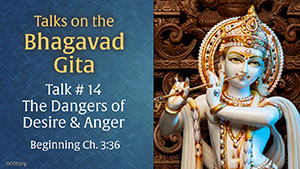
Talk 14–The Dangers of Desire & Anger
Swamiji discusses the Hindu concept of sin (papam–wrong-doing), and the nature of desire and anger as the prime obstacles in spiritual life, and shares a story of Yogananda.
Beginning Chapter 3:36
Talk 15–Controlling the Senses
Swamiji discusses the effects of spiritual ignorance, the need to control our senses, the different levels of the mind, and why a yogi needs a sense of humor. Beginning Chapter 3:37
Talk 16–Stories of Yogis
Swamiji discusses how we can become like Arjuna: “foe consumers.” He talks about various yogis he knew, such as Swami Rama of Hardwar, Anandamayi Ma, Swami Sivananda of Rishikesh, Sri Datta Bal and others. Beginning Chapter 3:31
Talk 17–Eternal Yoga
Swamiji discusses what Krishna says is the “Eternal Yoga taught from the beginning,” shares stories of Anandamayi Ma, and discusses how God incarnates. Beginning Chapter 4:01
Talk 18–Why Does God Incarnate?
Swamiji discusses what Maya really is, and why God incarnates from age to age, plus other aspects of Krishna’a teachings in the Gita.
Beginning Chapter 4:07
Talk 19–Traits Developed by Yoga
Swamiji discusses how God incarnates to facilitate our enlightenment, traits one will develop when successfully practicing yoga, the practice of Japa Yoga, and some of the ways to approach God. Beginning Chapter 4:10
Talk 20–Action & Inaction
Swamiji discusses the nature of action and inaction, how we can view situations in our spiritual life objectively and intelligently, and how we must restrain our thought and our lower self. Beginning Chapter 4:16
Talk 21–Qualities for Success in Yoga
Swamiji discusses the spiritual qualities needed for success in yoga, how to dissolve karma, the prayer used by monks before meals, and the different types of offerings in spiritual life. Beginning Chapter 4:22
Talk 22–What Is Pranayama?
Swamiji discusses Different forms of sacrifice (yagña, offering), what pranayama really is, diet as a spiritual offering, plus other aspects of Krishna’a teachings in the Gita. Beginning Chapter 4:29
Talk 23–The Sacrifice of Wisdom
Swamiji discusses more on sacrifice (yagña, offering), the positive effect of true faith (shraddha), and the negative effect of doubt. Beginning Chapter 4:33
Talk 24–Renunciation vs. Karma Yoga?
Swamiji discusses renunciation and karma yoga and which is better, according to Krishna, the concept of Darshanas (viewpoints in Hinduism) and our inner nature as the Eternal Witness. Beginning Chapter 5:01
Talk 25–The Nine Chakras
Swamiji discusses the two types of “I”ness and the “nine gates” of yoga–the nine chakras of the Nath Yoga Tradition. Beginning Chapter 5:10
Talk 26–The “Thatness” of God
Swamiji discusses why the Gita and other scriptures of India use the word “Tat,” –That, for God, as well as having a universal vision: seeing God in all beings. He talks about Swami Sivananda and his poem “Only God I Saw.” Beginning Chapter 5:17
Talk 27–Using Spiritual Intelligence
Swamiji discusses how we should respond to both good and evil, and shares quotes and stories of Yogananda and Sri Ramakrishna. He also discusses the concepts of raga and dwesha (attraction and repulsion), factors the yogi must master in his spiritual life. Beginning Chapter 5:20
Talk 28–Happiness from Within
Swamiji discusses the happiness and illumination produced by yoga, what Nirvana really is, eye position in meditation, and the yogi’s real Kechari Mudra, as well as other useful topics. Beginning Chapter 5:24
Talk 29–The Yoga of Meditation
Swamiji discusses spiritual duty, and the “Nitya Karmas–the duties of householders, as well as making the lower self a friend of the Higher Self. He shares a story about the slanders that were directed towards Anandamayi Ma during her life, and how she dealt with them. Beginning Chapter 6:01
Talk 30–Knowledge and Discrimination
Swamiji discusses a wide range of topics, including spiritual knowledge (jnana) and discrimination (viveka), fixing the mind on the Self, and the example of Anandamayi Ma in impartiality. Beginning Chapter 6:08
Talk 31–A Yogi’s Place of Meditation
Swamiji discusses different aspects of medition, including posture, practice, and a yogi’s seat, as well as the contested meaning of “nasikagram,” focusing on the root of the nose, plus more on Krishna’a teachings in the Gita. Beginning Chapter 6:11
Talk 32–The Yoga Life
Swamiji discusses details Krishna mentions about spiritual life, including eating, sleeping, and moderation in all things. He shares a story of Sister Durga, Paramhansa Yogananda’s advanced disciple, and controlling the mind, and more. Beginning Chapter 6:16
Talk 33–Priorities in Spiritual Life
Swamiji discusses priorities in spiritual life, and obstacles to those priorities. He shares a story about Lahiri Mahasaya, how to develop will-power, and clarifies the true meaning of “sin.” Beginning Chapter 6:21
Talk 34–Seeing God Everywhere
Swamiji discusses the false secular/spiritual divide, Arjuna’s question about the restlessness of the mind, and shares a story of Yogananda from someone who knew him. Beginning Chapter 6:30
Talk 35–Falling from Yoga
Swamiji discusses those who have faith but are yet uncontrolled, and what Krishna says about those who fall from yoga. He also shares stories about Anandamayi Ma, Paramhansa Yogananda, and Yogananda’s disciple Swami Kriyananda. Beginning Chapter 6:37
Talk 36–Going Beyond the Vedas
Swamiji discusses what the Vedas are, and how the yogi goes beyond the vedas. He talks about yoga as superior to asceticism, and the necessity for perseverance and mastery. He also shares a story about Anandamayi Ma. Beginning Chapter 6:44
Talk 37–Knowledge and Realization
Swamiji shares Krishna’s teachings on how to know Him. He discusses the rarity of those who seek and find God. He also shares a story of a meeting with Swami Kriyananda, Yogananda’s monastic disciple. Beginning Chapter 7:01
Talk 38–Spiritual Cosmology
Swamiji discusses the cosmology, both cosmic and personal, taught in the Gita. He share the various similes about God Krishna talks of. Beginning Chapter 7:04
Talk 39–Tapasya: Spiritual Practice
Swamiji discusses the subject of tapasya. He share more the various similes about God Krishna talks of, such as Intelligence and Strength. He briefly touches on the gunas, and what Krishna says about evil-doers. Beginning Chapter 7:09
Talk 40–Four Types Who Seek God
Swamiji discusses the four kinds of people seek God: the distressed, seekers for knowledge, seekers of wealth, and the wise. What are the characteristics of each type, and which is the best? Beginning Chapter 7:16
Talk 41–Seeking Refuge in God
Swamiji discusses the types of people who seek God, and the subject of seeking refuge in God. He shares a story of Lahiri Mahasaya, and a saying of Yogananda Beginning Chapter 7:19
Talk 42–God Beyond Manifestation
Swamiji discusses God in manifestation, veiled by Maya and also beyond manifestation. He also shares stories of Anandamayi Ma. Beginning Chapter 7:24
Talk 43–Arjuna’s Cosmic Questions
Swamiji discusses the many questions Arjuna asks Krishna at the beginning of this chapter. Krishna talks of how a person’s thoughts at the time of death determine the next birth. Beginning Chapter 8:01
Talk 44–Going Beyond Rebirth
Swamiji discusses possible danger with yoga, the wider meaning of Brahmacharya, yoga discipline, and the need to think of God constantly for the yogi, as well as the sorrows of the world. Beginning Chapter 8:11
Talk 45–Brahma’s Day & Night
Swamiji discusses Brahma’s Day and Night (the Yugas), who Brahma is, freedom from rebirth for those who attain God, and sadhana as the means of purification to attain that Unity. Beginning Chapter 8:16
Talk 46–Royal Science & Royal Secret
Swamiji discusses what is real faith, and what is disbelief, as well as what will happen to those with no faith. He also talks about the “secret” of the Gita. Beginning Chapter 9:01
Talk 47–Dwelling in God
Swamiji discusses the Hindu concept of ages (kalpas), what is prakriti, and how both deluded souls and great souls repond to God. Beginning Chapter 9:06
Talk 48–Steadfast Devotion
How we abide in our divine nature, how half-hearted observance of dharma effects us, and Swami Vivekananda’s experience that changed his spiritual outlook. Beginning Chapter 9:14
Talk 49–Ways of Worshipping
What Krishna says is his relationship to the world, what happens if one attains the world of Indra (the king of the devas), those who worship God, and those who worship God with a mistaken approach. Beginning Chapter 9:19
Talk 50–Relating to God
Forming a personal relationship with God, the benefits of being a devotee, the ever-present reality of God, among other topics. Beginning Chapter 9:29
Talk 51–God as the Source of All
What it means to be “beloved of God,” who were the saptarishis and the manus, and a humorous story of St. Teresa of Avila, among other topics. Beginning Chapter 10:01
Talk 52–The Yoga of Devotion
Swamiji discusses devotion, as taught by Krishna, whether it is better to approach God as the Unmanifest or as Personal (Saguna). He also discusses the use of the mantra Soham. Beginning Chapter 10:01
Talk 53–God’s Power Within Us
The hierarchy of spiritual attitudes: action (karma), knowledge, meditation, and renuciation. He talks about manifesting God’s power within us, and the positive attitudes we should cultivate Beginning Chapter 12:11
Talk 54–How to Be Dear to God
Swamiji discusses not being agitated by the world, and not agitating the world. He also suggests we should analyze our spiritual surrounding and determine if they help or hinder us. Beginning Chapter 12:14
Talk 55–Essential Spiritual Qualities
A list of spiritual qualities needed by the aspiring yogi, such as objectivity, freedom from anxiety, being balanced in mind and many others. Beginning Chapter 12:15
Talk 56–Qualities of Devotion
Swamiji discusses seeing the world with equal vision, the qualities of devotion, contentment and silence. Beginning Chapter 12:19
Talk 57–The Field & Its Knower
Swamiji discusses Purusha and Prakriti, the Knower of the Field and the Field, of Sankhya philosophy. He tells what the Purusha is and Prakriti, both cosmic and immanent. Beginning Chapter 13:01
Talk 58–Qualities for Moksha
Swamiji discusses a list of qualities Krishna says are essential for the yogi to attain liberation (moksha). Beginning Chapter 13:07
Talk 59–More Qualities for Moksha
Swamiji discusses more from a list of qualities Krishna says are essential for the yogi to attain liberation (moksha) Beginning Chapter 13:08
Talk 60–Knowledge of the Supreme Self
Swamiji discusses Discrimination between the Knower and the known, and what must be known to attain immortality. Beginning Chapter 13:11
Talk 61–Qualities of Brahman
The qualities of Brahman as outlined by Sri Krishna, and how a yogi must purify his consciousness to perceive and eventually embody these qualities. Beginning Chapter 13:15
Talk 62–Purusha, Prakriti & the Gunas
The outline that Krishna gives regarding Purusha and Prakriti: what they are and how an understanding of their difference is important for the yogi. Beginning Chapter 13:21
Talk 63–Seeing the Lord in All
Swamiji discusses the transcendent state where one sees all as a manifestation of God, not as an idea, but as an actual experience. Beginning Chapter 13:27
Talk 64–What Is Pralaya?
Swamiji discusses God as the source of all, and begins the 14th chapter on the three gunas. He discusses Brahma (as opposed to Brahman) and the creation and dissolution of creation, called pralaya. Beginning Chapter 13:33
Talk 65–Introduction to the Gunas
Swamiji introduces the three gunas: sattwa, rajas, and tamas. He discusses the nature of each of these modification of Prakriti (primal Nature). Beginning Chapter 14:05
Talk 66–Sattwa, Rajas and Tamas
Swamiji continues Krishna’s talk on the three gunas: sattwa, rajas, & tamas. He discusses the signs of each guna’s presence and dominance, & the attachments caused by each guna. Beginning Chapter 14:06
Talk 67–Going Beyond the Gunas
Swamiji continues Krishna’s talk on the three gunas: sattwa, rajas, & tamas. He discusses the marks of one who has gone beyond the gunas, & the qualities of equal vision. Beginning Chapter 14:21
Talk 68–Yoga of the Supreme Spirit
Swamiji examines Krishna’s analogy of the Eternal Ashwattha Tree (creation) and how to cut the tree with the ax of non-attachment. Beginning Chapter 15:00
Talk 69–Become Self-Illumined
Swamiji examines becoming “swayamprakash,” self-illumined, and what it means to be undeluded. Beginning Chapter 15:06
Talk 70–The Striving Yogi
Swamiji discusses the yogi broadening his consciousness, and the difference between I.Q. and spiritual intelligence. Beginning Chapter 15:11
Talk 71–God’s Power In Us
Swamiji discusses the Divine power in the sun, and memory and knowledge from God. He also shares a story of Anandamayi Ma. Beginning Chapter 15:12
Talk 72–The Divine & The Demonic
Swamiji defines Krishna’s ideas on Divine and Demonic, and learning to discern between the helpful and harmful. He also shares a story of a devotee of Anandamayi Ma who met the Franciscan saint, Padre Pio.
Beginning Chapter 16:01
Talk 73–Create a Destiny of Enlightenment
Swamiji discusses qualities for the successful yogi, personal sacrifice, and Swadhyaya as introspection.
Beginning Chapter 16:01 (cont.)
Talk 74–Virtues Needed for Yogis
Swamiji discusses characteristics for capability of yoga, and how virya (vigor) is necessary for the aspiring yogi, and the negative qualities a yogi avoids.
Beginning Chapter 16:01 (cont.)
Talk 75–Qualities of Demonic Men
Swamiji discusses what devas and asuras are, and what demonic men and women are like.
Beginning Chapter 16:07
Talk 76–Traits of the Demonic Mind
Swamiji discusses the negative qualities such as greed, violence, vanity, desires, which lead to delusion.
Beginning Chapter 16:12
Talk 77–Qualities of Evil
Swamiji discusses the qualities of an evil mind, and the need to separate ourselves from such people. He also shares the story of Yogananda’s saintly devotee, Luther Mckinnie.
Beginning Chapter 16:18
Talk 78–The Triple Gate of Hell
Swamiji discusses the three qualities which cast us down: Kama, Krodha, and Lobha: Lust (intense desire in general), anger, and greed. He also talks of using the scriptures as guides for our upliftment.
Beginning Chapter 16:20
Talk 79–How Externals Affect Us Inwardly
Swamiji discusses externals in religion, and how they can affect us, and the food, sacrifice, tapasya and almsgiving liked by people of different gunas.
Beginning Chapter 17:05
Talk 80–Spiritual Practice & The Gunas
Swamiji discusses what is sacrifice (yagna), and Observing the teachings of the scriptures.
Beginning Chapter 17:11
Talk 81–Threefold Austerity
Swamiji discusses tapasya (austerity) of the body, speech and mind according to Krishna, and how to gain tranquility of mind.
Beginning Chapter 17:14
Talk 82–About Om Tat Sat
Swamiji discusses the threefold kinds of giving, according to the gunas, and the meaning of OM TAT SAT.
Beginning Chapter 17:20
Talk 83–Liberation by Renunciation
Swamiji discusses what is meant by renunciation, and the difference between Sannyasa and Tyaga.
Beginning Chapter 18:01
Talk 84–Sannyasa & Tyaga
Swamiji discusses what is meant by renunciation, and the difference between Sannyasa and Tyaga.
Beginning Chapter 18:12
Talk 85–3 Types of Action
Swamiji discusses what is sacrifice (yagna), and Observing the teachings of the scriptures.
Beginning Chapter 18:23
Talk 86–3 Types of Intellect
Swamiji discusses three types of intellect according to the gunas: sattwa, rajas, and tamas, as well as three types of firmness of intellect.
Beginning Chapter 18:29
Talk 87–Threefold Happiness
Swamiji discusses three types of happiness according to the gunas: sattwa, rajas, and tamas.
Beginning Chapter 18:36
Talk 88–All About the 4 Castes
Swamiji discusses what caste is according to the Gita, as opposed to the “caste system” or castism. He talks about the inherent qualities of Brahmins, Kshatrias, Vaishyas and Sudras.
Beginning Chapter 18:40
Talk 89–Attaining Perfection by Duty
Swamiji discusses about swakarma (a person’s own duty), and how it is better to do ones own duty, though flawed, than another’s duty done well.
Beginning Chapter 18:45
Talk 90–How to Realize the Self
Swamiji discusses three types of intellect according to the gunas: sattwa, rajas, and tamas, as well as three types of firmness of intellect.
Beginning Chapter 18:53
Talk 91–The Battle for Higher Consciousness
Swamiji discusses the battle for higher consciousness. He shares stories about Mirabai and Yogananda.
Beginning Chapter 18:59
Talk 92–Love of God (Both Ways)
Swamiji discusses the love of God for us, and how we should respond with love for him, and what real divine love is. He recounts what it was like to sit in the presence of Anandamayi Ma.
Beginning Chapter 18:64
Talk 93–Krishna’s Final Words
Swamiji concludes his commentary on the Gita. He discusses what Krishna says about who to share these teachings with, and who not to, and talks about the benefits of studying the gita. Sanjaya then wraps up what has gone before in the Gita.
Beginning Chapter 18:67

